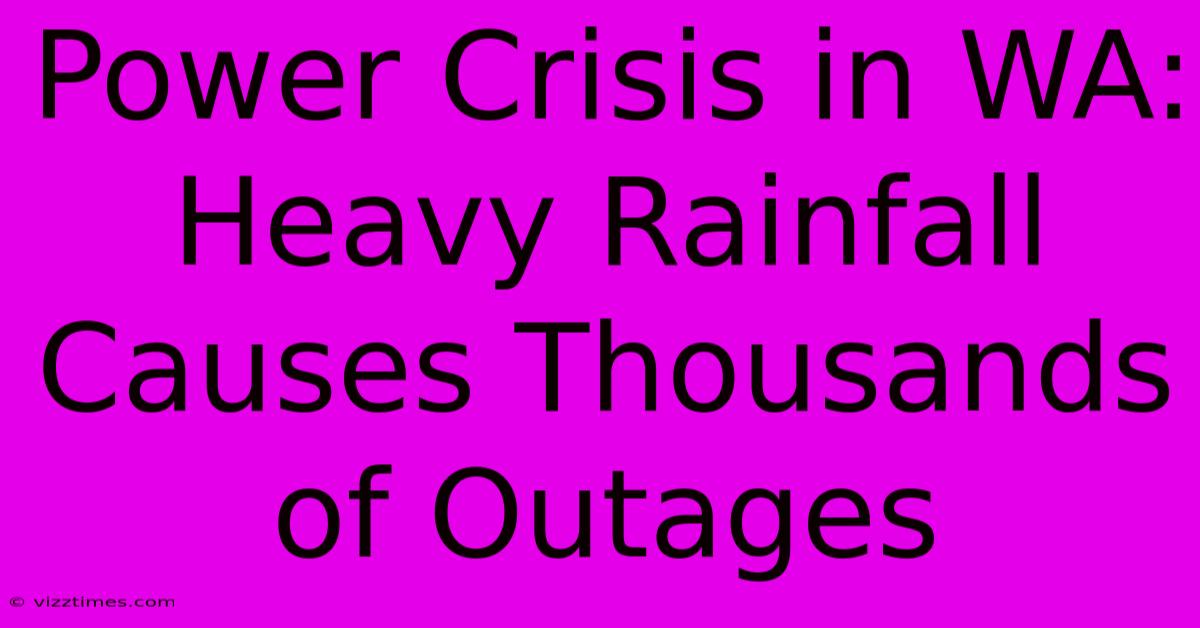Power Crisis In WA: Heavy Rainfall Causes Thousands Of Outages

Table of Contents
Power Crisis in WA: Heavy Rainfall Causes Thousands of Outages
Man, oh man, the rain! We've all seen the news, right? The crazy amount of rain slamming Western Australia lately? It’s not just about soggy shoes and flooded streets, folks. This deluge has caused a massive power crisis, leaving thousands in the dark and cold. I’m talking thousands. Seriously, it’s been a wild ride.
The Storm's Impact: More Than Just a Little Rain
This wasn't your average spring shower. We're talking record-breaking rainfall, the kind that makes you question if the apocalypse is upon us. The sheer volume of water overwhelmed the system. Trees toppled like dominoes, taking power lines with them. It was a total disaster. I actually had a huge oak tree fall right into my neighbor's yard – thankfully, missing the house by inches! But the power lines? Not so lucky.
Downed Power Lines and Beyond
The fallen trees weren’t the only culprits. Flooding also played a significant role. Substations got swamped, transformers shorted out, and the whole electrical grid started to crumble. It was a cascading effect, one problem leading to another, and another, until we were staring at a full-blown power crisis. It reminded me of that time I tried to build a Lego castle – one tiny piece out of place, and bam, the whole thing collapses! This was on a much, much larger scale.
My family and I lost power for three days. Three whole days! No lights, no internet (which, let's be honest, was the worst part), and definitely no air conditioning. I mean the refrigerator was the main concern here and we lost a bunch of food. It was crazy. We huddled together, played card games by candlelight, and tried to keep the kids from driving us completely bonkers. It was a bonding experience, I guess. But let me tell you, three days without power is way too long.
The Aftermath: Dealing with the Outages
The outages weren't just inconvenient; they were dangerous too. Many people lost food due to spoilage in the refrigerator and freezer. I even know people who had to throw away their entire harvest for the year. Hospitals had to rely on backup generators, and some businesses were forced to shut down completely. It was a city-wide chaos.
The restoration process was slow and frustrating. Power crews worked around the clock, but the sheer scale of the damage was staggering. They were dealing with flooding, downed trees, and damaged infrastructure – all at the same time. We were in line for food and water rations! A true wake up call. It really put things into perspective for us. It wasn't fun. It was difficult to be positive during those times. I should have filled the bathtub with water. We were seriously lucky.
Essential Tips for Future Outages
So, what did I learn from this whole ordeal? A bunch! And I’m sharing it all with you to help you avoid the same kind of stress.
- Prepare a Go-Bag: Seriously, this is crucial. Stock up on essential items like water, flashlights, batteries, and non-perishable food. Think about a first aid kit and a battery powered radio too. This can be a life saver.
- Keep Your Phone Charged: Sounds obvious, I know. But make sure to keep your phone fully charged. We need to stay connected and even more so in a crisis. Also get a portable charger, because you may not have electricity when you need it most.
- Check on Your Neighbors: During these times, you've got to look out for your neighbors. Check on the elderly, those with disabilities, and anyone who might need assistance.
- Be Patient: Power restoration takes time, especially after a major event like this. It may take days before your electricity is back on. Take a deep breath, grab that Go-bag and chill out!
The Long-Term Effects: Resilience and Infrastructure
This power crisis highlighted some serious weaknesses in WA's infrastructure. It also revealed just how dependent we are on electricity in our day-to-day lives. I think about this now. We totally need more resilient systems. Better infrastructure is definitely needed. And better preparedness from the people too! This is so important.
The government needs to invest in improving the power grid, making it more resistant to extreme weather events. We also need better communication systems to keep people informed during emergencies. I'm not an expert on this type of stuff, but that's my take on it. It's all common sense.
Learning from the Storm: Preparing for the Future
The recent power crisis in WA was a stark reminder of how vulnerable we are to extreme weather. It was a pretty rough experience, but we survived it. And we learned a lot. I hope you'll take these tips and use them. Because seriously, being prepared is so important. It makes the difference. It helped us immensely. Don't wait until the next storm hits to get ready. Be prepared, folks. It's the best way to protect yourselves and your families. This way you'll know what to do. And if you already know what to do, there's a high chance you won't freak out!

Also read the following articles
| Article Title | Date |
|---|---|
| Job Security Jeopardy Are Your Clothes And Tattoos A Liability | Jan 25, 2025 |
| From Runway To Ruin How Clothing Choices Impact Your Career | Jan 25, 2025 |
| 76ers 3 Point Barrage Stuns Cavaliers 132 129 Victory | Jan 25, 2025 |
| Nfl Coaching Shuffle 49ers Reunion With Robert Saleh On The Horizon | Jan 25, 2025 |
| Rantanen And Hall Traded Hurricanes Big Move Shakes Up Nhl | Jan 25, 2025 |